Related Research Articles

The Communist Party of India (Marxist) is a communist political party in India. It is one of the national parties of India. The party emerged from a split from the Communist Party of India (CPI) on 7 November, 1964.

The Communist Party of India (CPI) is the oldest communist party in India and one of the eight national parties in the country. The CPI was founded in Kanpur on 26 December 1925.
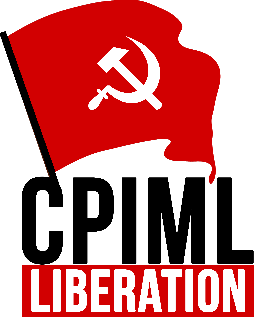
The Communist Party of India (Marxist–Leninist) Liberation, also referred to as the Liberation group, is a communist political party in India.
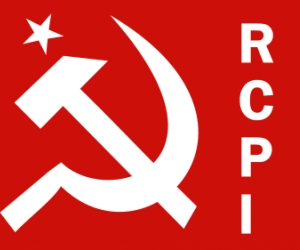
The Revolutionary Communist Party of India is a small political party in India. The party was founded as the Communist League by Saumyendranath Tagore in 1934, breaking away from the Communist Party of India (CPI). RCPI led armed uprisings after the independence of India, but later shifted to parliamentary politics. The party is active in the Kerala, West Bengal and Assam. The party was represented in the West Bengal while being a part of Second United Front Cabinet (1969) as well as in various state government during the Left Front rule in the state (1977–2011). In Assam the party won four Legislative Assembly seats in 1978, but its political influence has since declined in the state.
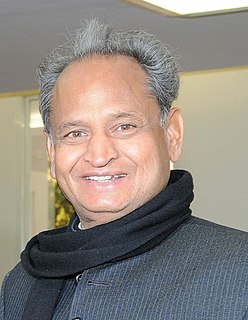
Ashok Gehlot is an Indian politician serving as the current Chief Minister of Rajasthan. He held this position from December 1998 to 2003, and from 2008 to 2013, and again from 17 December 2018.
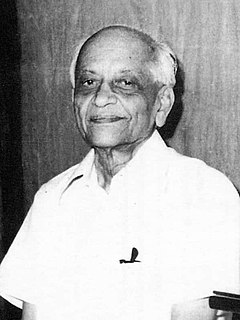
Shripad Amrut Dange was an Indian Politician who was a founding member of the Communist Party of India (CPI) and a stalwart of Indian trade union movement. During the 19th century, Dange was arrested by the authorities for communist and trade union activities and was jailed for an overall period of 13 years.
Socialism in India is a political movement founded early in the 20th century, as a part of the broader movement to gain Indian independence from colonial rule. The movement grew quickly in popularity as it espoused the causes of India's farmers and labourers against the zamindars, princely class and landed gentry. Socialism shaped the principal economic and social policies of the Indian government but mostly followed Dirigism after independence until the early 1990s, when India moved towards a more market-based economy. However, it remains a potent influence on Indian politics, with many national and regional political parties espousing democratic socialism.
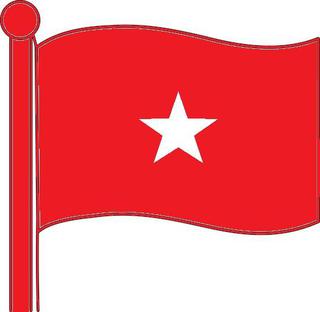
The Bolshevik Party of India is an Indian political party in India. The party was founded in 1939. The party had a certain role in the trade union movement in West Bengal and was briefly represented in the state government in 1969. In later years the party has played a negligible role in Indian politics.
K. Ramani was an Indian politician. He was elected to the Lok Sabha in 1969, four times to the Tamil Nadu Legislative Assembly and was the Tamil Nadu State Committee president of the Centre of Indian Trade Unions.
Kailash Bhansali was the member of the Rajasthan Legislative Assembly from Jodhpur City in Rajasthan state in India as of 2014.
Chaturanan Mishra was an Indian politician and trade unionist. Mishra, who was born in Nahar, Madhubani District, was a key leader of the Communist Party of India in Bihar, and served as the Agriculture Minister of India in the United Front government.
Drupad Borgohain was an Indian politician. He was a veteran leader of the left-wing in the Assam state. As of 2014 he was the secretary of the Assam State Council of the Communist Party of India (CPI), a position he held since 1987. As of 2010 he served as president of Assam state council of All India Kisan Sabha.
Meghraj Tawar is an Indian politician. He is a leader of the Communist Party of India. As of 2010 he was the Udaipur District Secretary of the party. A former member of the Rajasthan Legislative Assembly, Tawar is a prominent profile of the party amongst the local Adivasi community.
Nurul Huda was an Indian politician, former Member of Parliament and former Member of the Legislative Assembly of Assam. A leader of the Communist Party of India (Marxist), Nurul Huda belonged to the Central Committee of the party.
Swami Kumaranand, born Dvijendra Kumar Naag, was an Indian politician and leader of Communist Party of India. A Congressman turned communist, he was a key builder of the communist movement in Rajputana and Madhya Bharat.
Krishnapada Ghosh (1914–1987) was an Indian politician and trade unionist. He served as West Bengal Minister of Labour 1969–1970 and 1977–1985. He was a Central Committee member of the Communist Party of India (Marxist). He was also a member of the Working Committee of the Centre for Indian Trade Unions.
Homi F. Daji was a member of the 3rd Lok Sabha of India. He represented the Indore constituency of Madhya Pradesh and was a member of the Communist Party of India.
Birendra Chandra Dutta was an Indian communist politician. He founded the communist movement in Tripura. Dutta was a member of the 1st Lok Sabha, the 3rd Lok Sabha (1962–1967) and the 5th Lok Sabha (1971–1977).
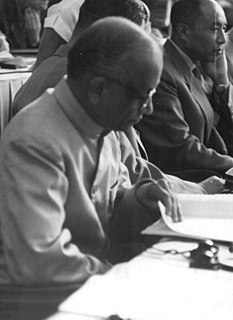
In 1964 a major split occurred in the Communist Party of India. The split was the culmination of decades of tensions and factional infighting. When India became independent in 1947, differences arose of how to adapt to the new situation. As relations between the Nehru government and the Soviet Union improved, a faction that sought cooperation with the dominant Indian National Congress emerged within CPI. This tendency was led by S.A. Dange, whose role in the party hierarchy became increasingly controversial. When the Sino-Indian War broke out in 1962 Dange's opponents within CPI were jailed, but when they were released they sought to challenge his leadership. In 1964 the party was finally divided into two, with the left faction forming the Communist Party of India (Marxist). The split had a lot of regional variations. It also impacted other organizations, such as trade union and peasant movements. The split has been studied extensively by scholars, who have sought to analyze the various domestic and international factors involved.
References
- 1 2 3 4 5 6 Rajasthan Directory & Who's who. Hindi Sahitya Mandir. 1982. p. 243.
- 1 2 Mainstream Weekly. My fond memories of Dr Usha Shrivastava
- ↑ The Hindu. Rajasthan Opposition leaders held
- 1 2 3 Lawrence Loy Shrader (1965). Politics in Rajasthan: A Study of the Members of the Legislative Assembly and the Development of the State's Political System. University of California. p. 371.
- 1 2 Marshall Windmiller (1994). Communism in India. University of California Press. p. 575. GGKEY:NSY99CAKNFU.
- 1 2 3 Rakhahari Chatterji (1980). Unions, Politics, and the State: A Study of Indian Labour Politics. South Asian Publishers. pp. 57, 60, 162.
- ↑ Election Commission of India. Rajasthan 1957
- ↑ All India Kisan Sabha. 22nd Conference: Proceedings and Resolutions
- ↑ Communist Party Publication. Communist Party of India. 1975. p. 68.
- ↑ Link: Indian Newsmagazine. 1979. p. 24.
- ↑ Communist Party of India. National Council (1980). Review of 1980 Mid-term Lok Sabha Elections and Resolutions Adopted by the National Council of the Communist Party of India, New Delhi, 30 January to 3 February 1980. Communist Party of India. p. 55.
- 1 2 Pakistan & Gulf Economist. Economist Publications. 1986. p. 60.
- ↑ India Today. CPI: A party shake-up in an Indian version of glasnost
- ↑ The Hindu. Rajasthan Opposition leaders held
- ↑ "I have no enemies: Shekhawat". Rediff. 22 July 2002. Retrieved 29 December 2021.
- ↑ Raina, Badri (16 September 2018). "The Plight of Mohan Bhagwat's Lonesome Lion". The Wire. Retrieved 29 December 2021.